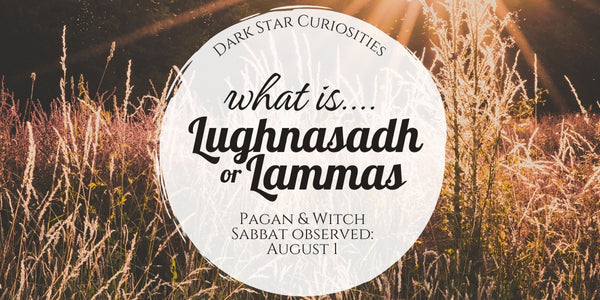
Lughnasadh, Lughnasad, Lughnasa or Lúnasa (Loo-nah-sahh) is a Gaelic festival marking the beginning of the harvest season, and an official holiday in Ireland. Historically, it was widely observed throughout Ireland, Scotland and the Isle of Man. To the members of the Asatru faith (Norse Pagans), Lammas is known as Freyfaxi. It refers to a festival held during Old Norse times when a horse is sacrificed as an offering to Freyr.
Lughnasadh is one of the 8 sabbats of the Witch’s wheel, or the Wiccan wheel of the year. While Lughnasadh is said to honor the God Lugh, there is currently hot debate on whether or not there was actually a Lugh in Celtic/Irish mythology.
Lots of different celebrations take place, but they are all concentrated around food and connection. There were religious ceremonies, ritual athletic contests, feasting, matchmaking, trading and feasting.
Food is an important feature of most Sabbats, but especially harvest holidays. This one in particular is noted as the First Harvest, so things like bread, meat and harvest items (like corn, blackberries, cherries, raspberries, etc) and libations (mead, beer and wine) are key.
Lughnasadh is not historically celebrated on August 1st in Celtic traditions. The August 1st date is a relatively “new” celebration date, as it’s based on the Gregorian calendar. This calendar didn’t exist at the time that Lughnasadh was widely celebrated. It only came about after Iron Age Britain. In modern times, August 1st is the most common observed date, which is actually very powerful. Because it is an agreed upon date by most modern Pagans (that observe Sabbats in general), this contributes to the collective energy and creates new rituals.
Some folks choose to observe this Sabbat on the astrological date. This is when the sun is 15° in Leo and the moon is in Taurus. The date in 2023 would be August 7th.
And as always, we have options. You could also utilize the coligny calendar to find the date of celebration. This is especially helpful for Lunar witches. The Coligny calendar is the Celtic lunisolar calendar that dates back to the first century AD and its use ended when the Roman Empire imposed the use of the Julian Calendar in Roman Gaul. The Coligny calendar is designed to keep perfectly in sync with the lunar phase, with a tolerance of less than 24 hours. Using this calendar, Lughnasadh is observed on the 2nd new moon after the summer solstice (Litha). It also marks the halfway point between the summer solstice (Litha) and the autumn equinox (Mabon).
Lughnasadh is also sometimes called Lammas and can be used interchangeably. Some modern Pagans avoid the use of the “Lammas” moniker since it has ties to Christianity. Lammas comes from an Old English phrase that translates to “loaf mass” (from the word "loaf" in reference to bread and "Mass" in reference to the Eucharist). In early Christianity, the first loaves of the season were blessed by the church during mass. As with many Pagan elements, this just so happened to coincide with Lughnasadh’s August 1st observance.
Celebrations for Lughnasadh can be as small, or elaborate as you’d like!
Low spoon celebrating: Eat comfort foods like bread, chili with rice and enjoy snacks like cherries, blackberries, grapes and raspberries. If you embibe, enjoy a beer, a glass of wine or mead to celebrate your ancestors. Spend time with loved ones, and light a candle for your ancestors.
Get wild! Host a dinner with friends and family, break bread and drink merrily. Prepare an altar for the harvest and God/desses of the hearth and field. Create a candle altar and ask for prosperous blessings in your home, especially for health/food/wealth/family. Perform spell work to get ready for the upcoming big holidays, especially Samhain.
CORRESPONDENCES:
Colors: Yellow, orange, gold, green
Foods: Grapes, wine, beer, bread, grains, blackberries, pears, raspberries, black currants, corn
Stones: Citrine, peridot, carnelian, gold topaz, clear quartz, amber
Symbols: Corn dollies, wheat, bread, cauldron, corn, herbs, threshing tools (scythe, sickle, etc…)
Flowers: Sunflowers
Deities: Lugh, Ceres, Vesta | Named for Celtic god Lugh (Lew in Welsh)

